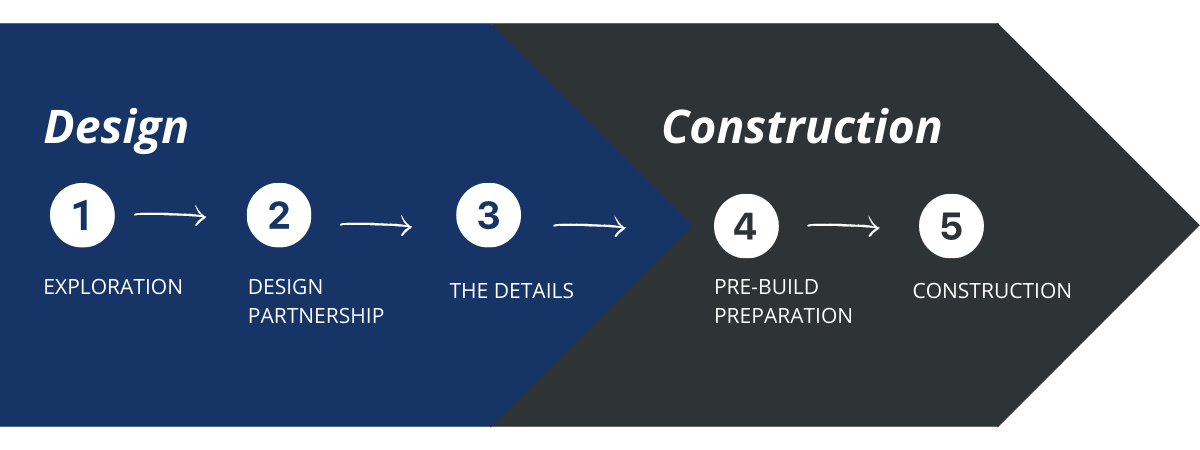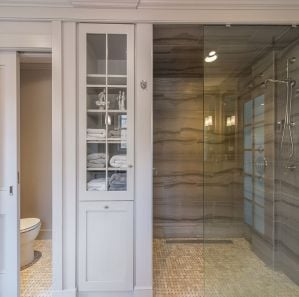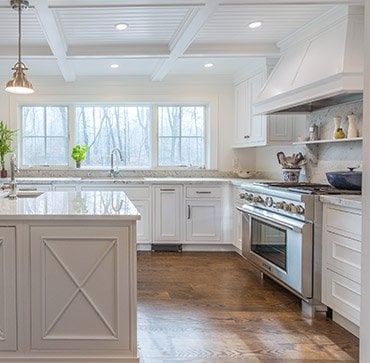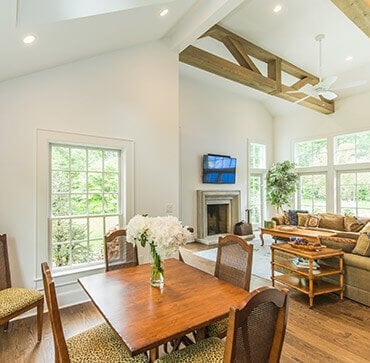.png?width=1800&height=1200&name=email%20(10).png)
This guide answers all of those questions, and more, so you can make the best choice for your remodel.
Quartz vs. Quartzite: A Quick Overview
To start, here’s the simplest way to understand the difference:
-
Quartz is a man-made engineered stone, created by blending ground natural quartz with resins and pigments.
-
Quartzite is a 100% natural stone, formed deep within the earth from sandstone that has been transformed by heat and pressure.
Although both are beautiful and durable countertop options, their performance, appearance, maintenance needs, and price points differ in meaningful ways.
.jpg?width=3600&height=2400&name=final-6%20(8).jpg)
How Quartz Is Made
Quartz countertops are composed of roughly 90–95% crushed quartz combined with resin binders and color pigments. Because it’s engineered, manufacturers can control the look, feel, and performance of the surface. This makes quartz incredibly consistent, which is ideal for homeowners who prefer a clean, uniform style.
Benefits of Quartz
-
Extremely low maintenance (no sealing required)
-
Highly resistant to stains
-
Wide range of colors and patterns
-
Great for modern, seamless designs
-
Non-porous
.jpg?width=6000&height=4000&name=4%20Angela%20Court%2c%20North%20Caldwell-5%20(5).jpg)
How Quartzite Is Formed
Quartzite is a natural stone created when sandstone undergoes intense pressure and heat. This fuses the sandstone into a harder, denser material. Each slab is one-of-a-kind, offering organic variation that you can’t replicate in engineered materials.
Benefits of Quartzite
-
Outstanding durability (harder than granite)
-
Natural veining and movement
-
Resistant to heat
-
Ideal for homeowners who love natural stone variation
-
Elegant, timeless appearance
.png?width=782&height=521&name=email%20(12).png)
Appearance: What Do Quartz and Quartzite Look Like?
Quartz Appearance
Because quartz is manufactured, its color range is almost unlimited. This makes it ideal for homeowners who want:
-
Pure whites
-
Matte blacks
-
Concrete-look shades
-
Marble-inspired veining
-
Soft neutrals
-
Consistent patterns
Quartz is excellent for kitchens designed with a modern, clean look, especially when we’re remodeling homes that want light, bright spaces.
Quartzite Appearance
Quartzite brings a natural, organic feel you simply cannot recreate. Many slabs feature:
-
Soft whites and creams
-
Subtle grays
-
Earth-tone veins
-
Bolder, marble-like movement
-
Hints of blue, gold, or green depending on the quarry
Every slab is unique. For homeowners who love texture and natural beauty, quartzite offers a timeless, high-end look.
.jpg?width=6000&height=4000&name=4%20Angela%20Court%2c%20North%20Caldwell-85%20(2).jpg)
Durability: Which Material Holds Up Better at Home?
Quartz Durability
Quartz is very strong and performs extremely well in high-traffic kitchens. It resists scratches, stains, and chips. However, because of the resin binders, it is not as heat-resistant. You should not place hot pots or pans directly on the surface.
Quartzite Durability
Quartzite is one of the hardest natural stones, harder than granite in most cases. It can tolerate heat better than quartz and stands up extremely well to everyday use. The one trade-off: it is porous, meaning it must be sealed periodically to prevent staining.
If durability is your top priority, both will perform exceptionally well, but quartzite has the edge when it comes to scratch and heat resistance.
.png?width=782&height=656&name=Untitled%20design%20(25).png)
Maintenance: Which Is Easier to Care For?
Quartz Maintenance
Quartz is very low maintenance. Since the surface is non-porous, you don’t need to worry about sealing, polishing, or special cleaners. Warm water and mild dish soap usually do the trick.
Quartzite Maintenance
Quartzite requires a bit more upkeep:
-
Needs sealing once or twice a year
-
Should be cleaned with gentle stone-safe products
-
Avoid harsh chemicals that can damage the sealant
It’s still easy to care for, but homeowners should be prepared for routine sealing.
.png?width=1800&height=1200&name=email%20(13).png)
Stain Resistance: Which Countertop Performs Better?
-
Quartz is extremely stain-resistant because it’s non-porous.
-
Quartzite, when properly sealed, resists stains well, but if the seal wears away, staining is possible.
If you’re the type who loves red wine, tomato sauce, or fresh berries, quartz may give you added peace of mind.
.png?width=1800&height=1200&name=email%20(15).png)
Heat Resistance: Which Countertop Can Handle the Heat?
-
Quartzite is more heat-resistant and better suited for direct or near-direct heat exposure.
-
Quartz, due to its resins, can discolor or crack if exposed to high heat.
We always recommend trivets for both, but quartzite provides a little more flexibility.
Color Options: Which Offers More Variety?
Quartz Options
Quartz offers hundreds of colors, patterns, and finishes. Manufacturers like Caesarstone, Cambria, and MSI produce:
-
Polished and matte finishes
-
Edge-to-edge veining
-
Modern solids
-
Faux-marble styles
-
Earthy tones
This makes quartz one of the most versatile options for any kitchen or bath remodel in New Jersey.
.png?width=1800&height=1200&name=Home%20Remodel%20Morris%20County%2c%20NJ%20(71).png)
Quartzite Options
Quartzite colors are more limited because it is 100% natural. However, the natural movement and veining are unmatched. Popular options include:
-
Taj Mahal (warm beige tones)
-
Sea Pearl (soft gray-green)
-
White Macaubas (light gray with linear veining)
-
Cristallo varieties (ice-like translucence)
If you love natural variations and character, quartzite will speak to you.
Price Comparison: Is Quartz or Quartzite More Expensive?
Costs depend on the material, brand, and fabrication requirements, but in general there is a clear difference between the two.
Quartz Pricing
Quartz is typically more budget-friendly and offers a wide range of options that fit comfortably within most remodeling budgets.
Quartzite Pricing
Quartzite tends to be more expensive due to its natural composition, rarity, and the additional labor required to cut and finish the stone.
In Morris County, quartz often falls slightly lower in price because fabrication and sourcing are more predictable. Quartzite tends to be a premium investment because each slab must be quarried, transported, and cut with extreme precision.
.png?width=1800&height=1200&name=Home%20Remodel%20Morris%20County%2c%20NJ%20(32).png)
Which Is Better for Kitchens?
Quartz is Ideal If You Want:
-
Low maintenance
-
A modern, consistent look
-
Strong stain resistance
-
A budget-friendly option
Quartzite Is Ideal If You Want:
-
A natural stone with organic veining
-
Superior heat and scratch resistance
-
A luxurious, high-end appearance
-
A unique slab that stands out
Both are excellent choices. The right choice depends on lifestyle and design vision.
.png?width=1800&height=1200&name=Home%20Remodel%20Morris%20County%2c%20NJ%20(7).png)
Which Is Better for Bathrooms?
Both materials perform extremely well in bathrooms. Quartz’s non-porous surface is popular for vanities, while quartzite adds a natural element that pairs beautifully with spa-style designs.
Quartz vs. Quartzite: Pros & Cons Summary
Quartz Pros
-
No sealing required
-
Consistent patterns
-
Highly stain resistant
-
Wide color options
Quartz Cons
-
Not heat-resistant
-
Less natural appearance
Quartzite Pros
-
Natural beauty
-
Very durable
-
Heat-resistant
Quartzite Cons
-
Requires sealing
-
Limited color range
-
Higher price point
.png?width=1800&height=1200&name=Home%20Remodel%20Morris%20County%2c%20NJ%20(11).png)
Which One Should You Choose? JMC’s Recommendation
At JMC, we recommend quartz for homeowners who want effortless maintenance and a clean, modern style, especially in busy kitchens. Quartzite is perfect for those who want the beauty of real stone and don’t mind a bit of routine upkeep.
The best way to decide is to see the slabs in person, compare them under natural light, and think about how you use your kitchen daily. During your design consultation, we walk you through each option and help you choose a material that balances style, performance, and budget.
If you’re ready to start planning your next project, our team is here to help. Reach out to schedule a consultation or explore our portfolio to see what’s possible for your home.









